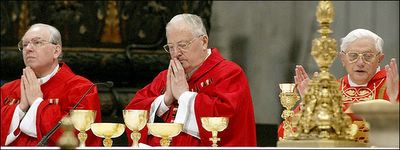Monday, April 18, 2005

Danilo Schiavella/EPA
From left, Cardinals Giovanni Battista Re, Angelo Sodano and Joseph Ratzinger celebrated a Mass at St. Peter's Basilica this morning
Even Cardinals Are Prone to Peer Pressure
By HENRY FOUNTAIN
TOMORROW, 115 of the most powerful Roman Catholic officials in the world will be locked into the Vatican, where they will live and breathe church issues, and personalities, 24 hours a day until they elect a successor to Pope John Paul II.
The conclave of cardinals will take place amid extraordinary secrecy and seclusion. No phone calls, letters or e-mail messages will be allowed - and certainly no "Survivor"-style camera crews asking the cardinals to explain their vote during each round of balloting.
These events are so secret that it is difficult for anyone outside the college of cardinals itself to fully know what goes on, at least for years afterward. One expert in organizational behavior described a papal conclave as "utterly opaque" and compared it, jokingly, to trying to understand the government of North Korea.
Although this is no ordinary deliberative body - and the cardinals no ordinary citizens - those who study group dynamics say that when the conclave begins, some ordinary things are likely to occur.
Being a cardinal "doesn't exempt you from basic psychological things happening," said Richard Moreland, a psychology professor at the University of Pittsburgh. And one basic psychological thing that happens in groups is that some members accede to the desires of others.
"Conformity is a big thing," Dr. Moreland said. There are two types: informational conformity, where one person believes others know best, and normative conformity, where fear of rejection or of loss of status is the driving force.
Some cardinals already have greater leadership roles; they travel and meet with other high church officials regularly. So informational conformity may play a role. Because well-connected cardinals may be perceived as having better access to information, they may hold sway over colleagues who work in relative isolation.
The influence may become apparent soon after the conclave starts. "One thing we know about groups is that they do tend to form status hierarchies very quickly," said Dr. Philip Tetlock, a professor at the Haas School of Business at the University of California, Berkeley. Dr. Moreland said the first ballot was important. "People will pay close attention," he said. "You might start to have coalitions in favor of certain candidates."
Coalition-forming will no doubt be spurred by the politicking that took place before the conclave. In interviews with the news media and in homilies during the days surrounding the pope's funeral, some cardinals tried to make a case, subtly, for one of their peers. Or for themselves.
But once the cardinals are inside, modern institutions like the media are forgotten. The college of cardinals has been charged with electing the pope for almost 1,000 years, and the first secluded conclave was held more than 700 years ago. The voting rules - the winner must receive a majority of two-thirds plus one - have existed with slight changes since 1179, although Pope John Paul II introduced a major change in 1996, requiring only a simple majority after a certain number of ballots.
The leaders who established the process seemed to know what they were doing. Indeed, a conclave might be close to the ideal group, said James Surowiecki, author of "The Wisdom of Crowds," about decision-making and group dynamics. "It's geographically and theologically diverse," he said. "And diversity is very important for groups to make smart decisions."
Dr. Moreland said the secrecy, which extends to the voting - cardinals are urged to disguise their handwriting when filling out ballots - may also help the process.
"You get much less conformity when people can respond anonymously," he said. "If nobody can tell you're defying the group, you have much less to fear."
Mr. Surowiecki said some members of the group may still "go along" with those of higher status, or those who are more talkative, or more confident. But higher status and verbosity do not necessarily correlate with greater intelligence or insight.
"The real paradox of group intelligence is that groups are smartest when everyone is acting as much like an individual as possible," Mr. Surowiecki said.
In the past, that has not always been possible. The conclave process was established in part to shelter against political or nationalist pressures, with limited success. Until the early 1900's, some Catholic nations had the right to veto a papal candidate.
Other pressures of a more physical nature have also been brought to bear. During a 13th-century conclave in Viterbo, Italy, one that might best be described as interminable (it lasted almost three years), the townspeople finally got fed up. They removed the palace roof to expose the cardinals to the elements, and sent in only bread and water. The deadlock quickly broke, and a layman was elected Pope Gregory X; he accomplished much in his five-year reign.
But there is no guarantee that the cardinals will make a good choice. Jerry B. Harvey, an emeritus professor of business at George Washington University, knows how a bad choice could happen. He has described what he calls the "Abilene paradox," when the pressure to conform based on fear makes people do things they don't want to do. (The name comes from a nightmarish car trip his family once took in Texas; when they got to Abilene, they realized that no one had wanted to go.) Dr. Harvey said he could imagine a situation in which the cardinals "would select somebody they'd all agree they didn't want."
It actually helps that the cardinals don't ordinarily spend a lot of time together. "If you know one another and don't want to rock the boat with each other," he said, "you end up going to Abilene."
Copyright 2005 The New York Times Company | Home | Privacy Policy | Search | Corrections | RSS | Help | Back to Top
